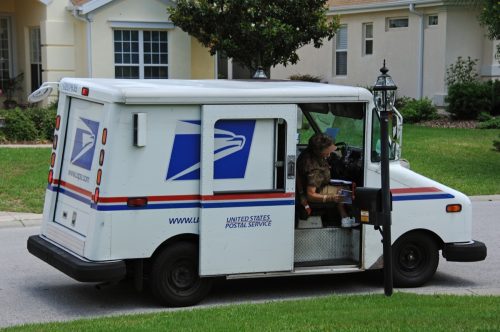If You Get an Email From the USPS With These 3 Words, Don’t Click on It

After ordering something online, many of us eagerly wait for the shipping info to hit our email inbox so we can track our packages from departure to arrival. But don’t let your excitement get the best of you. Not every email that appears to be sent from the U.S. Postal Service (USPS) is what it seems. In fact, scammers will often target people’s inboxes with fake messages claiming to be from the USPS. And while these notices can come in all shapes and sizes, the agency says one tell-tale sign that you’re being deceived is the presence of three specific words in the subject line. Read on to find out what you should be on the lookout for in your inbox.
RELATED: If You Get This Message From the USPS, Don’t Open It.
If you get an email from the USPS with three specific words in the subject line, don’t open it.

While you can receive legitimate email correspondence from the USPS, the U.S. Postal Inspection Service (USPIS)—the Postal Service’s legal arm—says it is “aware of the circulation” of fake emails claiming to be from the agency. According to a Jan. 7 update on the USPIS website, some customers have been receiving fraudulent messages in their email inbox that include these three words in the subject line: “Delivery Failure Notification.”
“If you ever receive an email about a package delivery or unpaid online postage charges, be careful,” the USPIS states on its website. “These emails appear to be from the U.S. Postal Service and include language regarding an unsuccessful attempt to deliver a package.”
This scam tries to get recipients to click on a phishing link.

This specific scam targets individuals in their email inbox by sending a message that indicates their package could not be delivered to their residence by the Postal Service, according to the Identity Theft Resource Center. “The fake notification instructs the recipient to click on a link within the email in order to ‘print a delivery label and pick up the package at their local post office,'” the organizations explains on its website. “Unfortunately, victims of this scam who click on the link expose their computer to a virus that steals personal information.”
This scam might evolve with minor changes over time, but in one of the latest versions, the link will take email users to a website that looks like a USPS website and instructs them to re-enter their address and a payment card for a $3 fee to reship their package. “All of the footer information is from USPS and takes people back to the legitimate USPS website,” the organizations warns.
RELATED: For more up-to-date information, sign up for our daily newsletter.
The USPS will not send certain things via email.

While you might receive shipping email updates from the USPS, officials warn that the agency will not notify you about a delivery failure through your email inbox. “Be aware that the U.S. Postal Service does not notify customers of package delivery attempts, or request personal information, via email,” the USPIS explains on its website.
If a mail carrier cannot deliver your package, they will likely leave you a Redelivery Notice on your front door or in your mailbox. “This form provides the customer with information on the type of mailpiece that was attempted by the carrier, why the mailpiece was not left, and which delivery options are available. It provides the customer with options and information they need to either request a redelivery or pick up their mailpiece at the Post Office,” the USPS explains.
There are other noticeable signs of fake USPS emails.

These three words are not the only sign of a fake USPS email. According to the Postal Service’s legal branch, many fraudulent messages also include poor grammar and spelling errors. Urgent emails are also likely fake. “If the email requests ‘immediate action,’ it could be a scam,” USPIS says.
The agency asks that you report any potential scam messages so that they can continue tracking how they evolve over time. “If you receive an email about a package delivery failure, forward it to [email protected], then delete the email,” the USPIS advises.
RELATED: The USPS Just Issued This Major Warning to Customers.